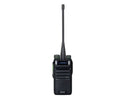
Everything You Need To Know About FCC Licensing
, by Joseph Gabriel, 5 min reading time

, by Joseph Gabriel, 5 min reading time

Do you have the proper certifications to operate your two-way radio equipment? Check out this helpful guide on everything you need to know about FCC licensing.
The Federal Communications Commission is a government agency that monitors and regulates various interstate and international communications throughout the electromagnetic spectrum. Of course, the FCC is most known for its role in censoring television and satellite media. However, the FCC actually regulates a wide range of communication systems and radio frequencies. Here are a few examples of electromagnetic spectrum services the FCC monitors:
Notably, the FCC's regulatory authority is the law in all 50 US states. The Enforcement Bureau of the FCC enforces many of the rules and regulations in the Commission's rules, the Communications Act, and various amendments, orders, or licensing terms and conditions.
It's normal for many people to wonder what the benefits are of creating a regular government agency responsible for monitoring communications systems. Originally, the Communications Act of 1934 developed the FCC in response to rising monopolies within the communications industry. Interestingly, the Radio Act of 1912 already established many rules and regulations regarding airwave interference that the Communications Act later adopted.
But since 1934, the FCC has grown and evolved to benefit our society in many other ways. For example, this government agency helped break telecommunications monopolies in 1996 by splitting AT&T into smaller companies. The FCC also fought hard in the 1940s to provide television standards that improved and opened up many broadcast channels.
Before we dive into the specific rules and regulations regarding FCC licensing requirements for two-way radio equipment, it's important to understand the importance and benefits of this licensing service. 2W GMRS frequencies are more secure and reliable than standard VHF frequencies largely because of FCC licensing!
Because all equipment on GMRS frequencies requires licensing, including licensed operators, channels are unlikely to experience interference from other communication systems. Importantly, all 22 GMRS channels are the ideal frequencies for businesses that rely on quick and clear communication.
Another benefit of receiving FCC licensing is that coverage lasts for 10 years (with a 90-day renewal window following the license's expiration). Plus, family members of licensed operators can legally operate your two-way radio equipment without requiring certification themselves.
You now know more about the FCC and the role they play in monitoring the electromagnetic spectrum, but how does that information impact your two-way radio equipment?
The FCC has specific licensing requirements for professional and commercial radio systems and devices to prevent overlap with alternative channels. Specifically, these regulations cover General Mobile Radio Services (GMRS) and some Family Radio Services (FRS). And since two-way radios share GMRS/FRS frequencies above 2W for increased security and performance, employees operating these communication devices must follow certain rules.
Of course, there are many different free-use radio service options for individuals and businesses. These include most of the Family Radio Service channels (the FRS shares 22 channels with the GMRS), Multi-Use Radio Services (MURS), and Low-Power Radio Services (LPRS).
Notably, MURS transmission equipment still requires FCC certification and is subject to various restrictions depending on your location. Still, these free-use radio services aren't always the most practical option for your company. For example, LPRS is a one-way communication service specifically designed for healthcare assistance and education applications. Additionally, FRS channels under 2W are less secure than 2W GMRS/FRS frequencies and suffer interferences more frequently.
Therefore, we recommend investing in GMRS two-way radio equipment and pursuing the proper licensing requirements for your business.
The punishments for operating GMRS radio communication systems without an FCC license are quite severe. In most cases, this type of infraction warrants criminal fines (if convicted in a federal district court) and even imprisonment. The standard FCC fine for unlicensed GMRS use is $10,000, but jail time cannot exceed two years. Furthermore, the FCC can remove your future GMRS broadcasting privileges entirely! While an individual improperly operating a GMRS device might fly under the FCC's radar, unlicensed use at your business is more obvious and a legal disaster just waiting to happen.
Our team at Atlantic Radio Communications wants to ensure you and your business avoid unnecessary fines and punishments related to improper GMRS use. Thankfully, getting proper FCC licensing for your two-way radios is actually quite simple! Here are the two main requirements you must meet for GMRS usage:
Additionally, GMRS licenses are no longer offered to nonindividuals, such as your business (unless your business license was granted before July 31, 1987). Therefore, you can only apply for individual GMRS licenses. Conveniently, your direct family members can also operate GMRS equipment after you receive your license, making this an attractive option for family-owned businesses!
You can complete an application form for a GMRS license if you meet the above requirements. This form, known as the FCC Form 605, is an exclusively electronic document available for online filing at the FCC's website. While the filing fees for the FCC Form 605 and GMRS licenses used to cost $70, the official price, as of April 19, 2022, is just $35. And as we mentioned before, this license boasts 10 years of coverage and a 90-day renewal window following the expiration date. The application process is quite simple, but don't hesitate to reach out to our friendly team at Atlantic Radio Communications for additional information and assistance regarding the FCC Form 605.
Follow this guide on everything you need to know about FCC licensing in relation to two-way radio communications systems to ensure FCC compliance! Additionally, ensure your business has the ideal tools for effective communication by browsing our two-way radios for sale here at Atlantic Radio Communications. Our high-powered devices feature GMRS 2W accessibility for secure channels and superior performance. Contact our team today to learn more about our GMRS equipment and relevant FCC regulations.
